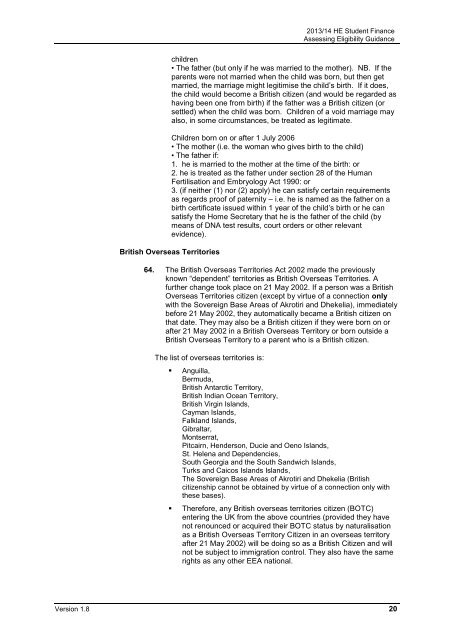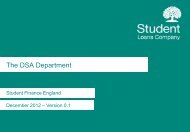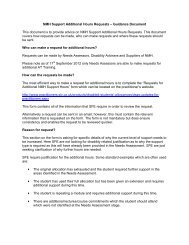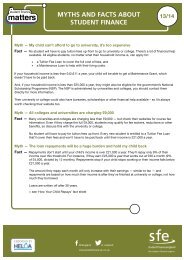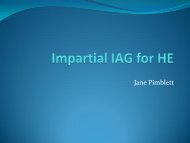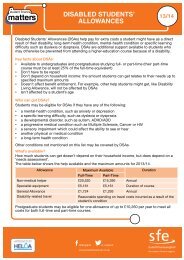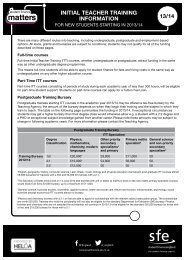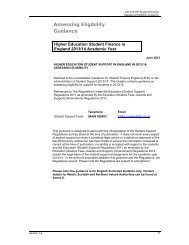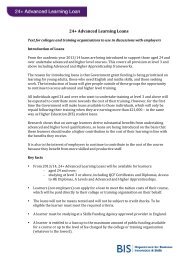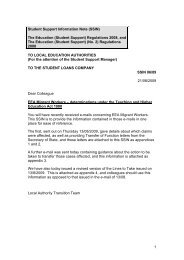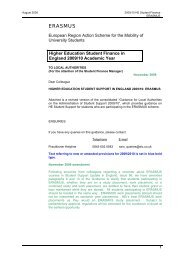SFE Assessing Eligibility Guidance 2013/14 - Practitioners - Student ...
SFE Assessing Eligibility Guidance 2013/14 - Practitioners - Student ...
SFE Assessing Eligibility Guidance 2013/14 - Practitioners - Student ...
You also want an ePaper? Increase the reach of your titles
YUMPU automatically turns print PDFs into web optimized ePapers that Google loves.
<strong>2013</strong>/<strong>14</strong> HE <strong>Student</strong> Finance<br />
<strong>Assessing</strong> <strong>Eligibility</strong> <strong>Guidance</strong><br />
British Overseas Territories<br />
children<br />
• The father (but only if he was married to the mother). NB. If the<br />
parents were not married when the child was born, but then get<br />
married, the marriage might legitimise the child‟s birth. If it does,<br />
the child would become a British citizen (and would be regarded as<br />
having been one from birth) if the father was a British citizen (or<br />
settled) when the child was born. Children of a void marriage may<br />
also, in some circumstances, be treated as legitimate.<br />
Children born on or after 1 July 2006<br />
• The mother (i.e. the woman who gives birth to the child)<br />
• The father if:<br />
1. he is married to the mother at the time of the birth: or<br />
2. he is treated as the father under section 28 of the Human<br />
Fertilisation and Embryology Act 1990: or<br />
3. (if neither (1) nor (2) apply) he can satisfy certain requirements<br />
as regards proof of paternity – i.e. he is named as the father on a<br />
birth certificate issued within 1 year of the child‟s birth or he can<br />
satisfy the Home Secretary that he is the father of the child (by<br />
means of DNA test results, court orders or other relevant<br />
evidence).<br />
64. The British Overseas Territories Act 2002 made the previously<br />
known “dependent” territories as British Overseas Territories. A<br />
further change took place on 21 May 2002. If a person was a British<br />
Overseas Territories citizen (except by virtue of a connection only<br />
with the Sovereign Base Areas of Akrotiri and Dhekelia), immediately<br />
before 21 May 2002, they automatically became a British citizen on<br />
that date. They may also be a British citizen if they were born on or<br />
after 21 May 2002 in a British Overseas Territory or born outside a<br />
British Overseas Territory to a parent who is a British citizen.<br />
The list of overseas territories is:<br />
• Anguilla,<br />
Bermuda,<br />
British Antarctic Territory,<br />
British Indian Ocean Territory,<br />
British Virgin Islands,<br />
Cayman Islands,<br />
Falkland Islands,<br />
Gibraltar,<br />
Montserrat,<br />
Pitcairn, Henderson, Ducie and Oeno Islands,<br />
St. Helena and Dependencies,<br />
South Georgia and the South Sandwich Islands,<br />
Turks and Caicos Islands Islands,<br />
The Sovereign Base Areas of Akrotiri and Dhekelia (British<br />
citizenship cannot be obtained by virtue of a connection only with<br />
these bases).<br />
• Therefore, any British overseas territories citizen (BOTC)<br />
entering the UK from the above countries (provided they have<br />
not renounced or acquired their BOTC status by naturalisation<br />
as a British Overseas Territory Citizen in an overseas territory<br />
after 21 May 2002) will be doing so as a British Citizen and will<br />
not be subject to immigration control. They also have the same<br />
rights as any other EEA national.<br />
Version 1.8 20


